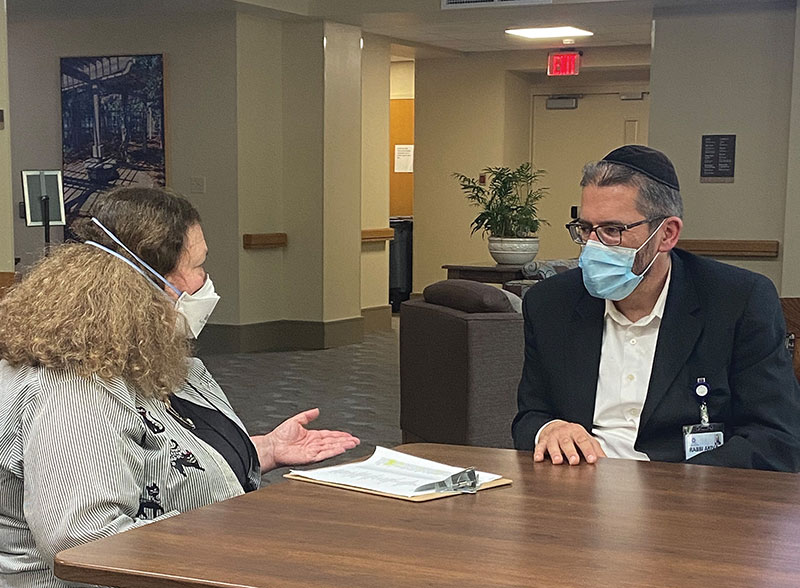Dear Friends of Mt. Sinai
In the past twelve months, Cleveland’s health and human services organizations have been challenged by post-pandemic conditions in ways we could not have imagined. In each of Mt. Sinai’s four grantmaking areas, the Health of the Jewish Community, the Health of the Urban Community, Academic Medicine and Bioscience, and Health Policy, we have seen grantee-partners struggle to continue serving those in need.
One of the crown jewels of our community, Menorah Park, was no exception. For years, the organization creatively balanced Medicaid long-term care reimbursement shortfalls through its rehabilitation services, home health and hospice care, and supportive housing for thousands of older adults throughout the region. But post-pandemic labor shortages coupled with inflation threatened its ability to provide the high quality of care for which Menorah Park has been known far and wide. In the face of these extraordinary circumstances, Mt. Sinai is proud to have joined the Jack, Joseph and Morton Mandel Foundation and the David and Inez Myers Foundation, as well as the Jewish Federation of Cleveland, to assist Menorah Park with addressing these issues. We are hopeful that this collective investment will strengthen a beloved care provider so it can continue, as one of its former campaigns stated so eloquently, to “care for all our tomorrows.”

Menorah Park
Menorah Park was not the only grantee-partner that faced workforce challenges. Senior Transportation Connection (STC), now in its 18th year of service and a shining example of regionalism in Cuyahoga County, can only serve County seniors if it has drivers to steer its vehicles. With increased competition from the likes of Amazon, STC too, with Mt. Sinai’s help, has had to forge creative solutions to post-pandemic challenges.

Senior Transportation Connection
In addition to operating support, Mt. Sinai provided a grant for STC to pursue increased governmental funding in recognition of the unique role its services play in keeping seniors living independently and in their communities for as long as possible.
Even the renowned Case Western Reserve University School of Medicine now operates in a more competitive environment than ever before. A top research medical school, CWRU competes for the best and the brightest students and faculty. In June, the Foundation approved a $2 million grant to help recruit more physician-scientists to Cleveland as Mt. Sinai Fellows in Therapeutics. With this grant, Case Western Reserve University School of Medicine and its clinical affiliates will inspire faster translational medicine, igniting more discoveries that translate from lab to bedside.
At the same time, the Foundation’s efforts to advance evidence-informed health policy has been as important as ever. Mt. Sinai staff continue to facilitate the Funders’ Collaborative on COVID Recovery’s multi-pronged state policy agenda to help Greater Cleveland bounce back from the pandemic stronger than ever. These efforts have focused on expanding school-based health services; increasing opportunities for residents to join the community health labor force; supporting the early care and education providers; and investing in public health preparedness through local and regional health departments.
The Foundation has also invested heavily in protecting comprehensive health care services. After the U.S. Supreme Court’s decision in Dobbs v. Jackson Women’s Health Organization, the Foundation made an initial investment of $500,000 to support reproductive health education, research, and regulatory compliance statewide on issues related to reproductive health. Mt. Sinai has proudly involved itself in educating policymakers and all Ohioans of the impact of the Dobbs decision on the women and families of our state.
Finally, and perhaps our most difficult and most rewarding work, the efforts to improve the health and the lives of Cleveland’s most marginalized families.
Mt. Sinai has been more than just a grantmaker in the urban community. Grantmaking is just one tool in our toolbox, as we work to improve the health of all Clevelanders. Mt. Sinai has become a trusted convener, an honest broker, and even an implementer of communitywide, evidence-based programs in health promotion and disease prevention.
We are a key partner in helping to improve health outcomes throughout Cleveland, a result of deep relationships with civic and neighborhood leaders. Here are some examples:
Our support for the Lead Safe Cleveland Coalition, which now comprises more than 500 individual members across more than 130 organizations. We are proud to report that nearly 25,000 rental units have been lead-safe certified. We still have a long road ahead of us in tackling this problem, but the Coalition will not rest until we put an end to the scourge of lead poisoning in Cleveland.

Nurse Family Partnership
The Nurse-Family Partnership home-visiting program, which sends trusted nurse-advisors to the homes of first-time moms…. now serves an ongoing caseload of 400 moms-to-be and their babies. We are grateful to MetroHealth for operating and expanding this program so successfully.
Our support for First Year Cleveland, the public-private partnership aimed at eliminating racial inequities in infant mortality. Mt. Sinai staff played a pivotal role in restructuring the organization so that it can focus on upstream drivers of poor maternal and infant birth outcomes that disproportionately impact black families.
Our support goes well beyond writing checks. As Past Board Chair Bennett Yanowitz used to say, “When Mt. Sinai speaks, we speak with a megaphone.” Today, we not only speak, we don’t only write checks. We act and we lead. The Mt. Sinai staff has taken on leadership roles not just willingly, but aggressively, because Mt. Sinai’s mission has become its life’s work.
We are a modest-sized foundation, yet over the past five years, we, together with all our many partners, have attracted more than $140 million to support our collective efforts. We rely on partnerships because the job of improving health is so much larger than what Mt. Sinai can accomplish on its own.
As we reflect on a year of challenges aplenty, let us resolve to work even harder in the years to come to give all Clevelanders the opportunity to live healthy and productive lives.
